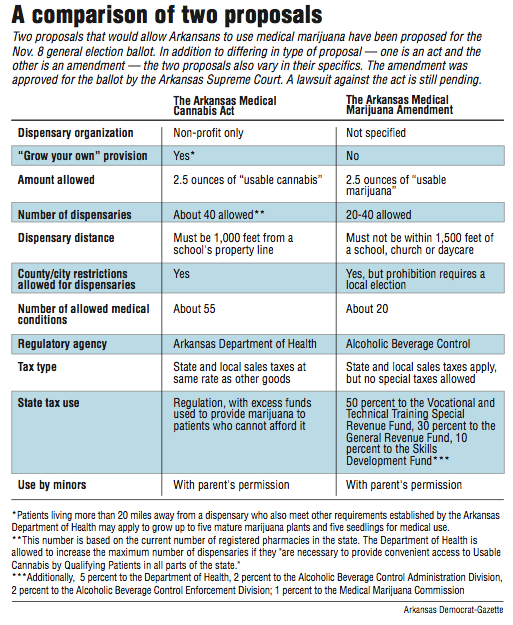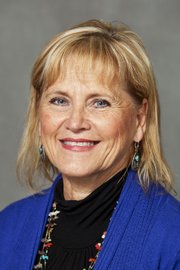The push for medical marijuana in Arkansas started with Denele Campbell and a woman she watched die of cancer.
RELATED ARTICLES
http://www.arkansas…">Arkansas expects Election Day surge http://www.arkansas…">14 vie for revived School Board http://www.arkansas…">Foe fears 'pot' drive a repeat of opioid push http://www.arkansas…">Local contested races http://www.arkansas…">2 again face off for sheriff's post http://www.arkansas…">Tax cut, experience key in Senate race http://www.arkansas…">Planning experience cited by NLR council hopefuls http://www.arkansas…">3 tout qualifications for LR board http://www.arkansas…">In LR's Ward 4, public safety is focus http://www.arkansas…">Other contested races http://www.arkansas…">County schools millage rate to stay same, but it's on ballot http://www.arkansas…">9 sites in Pulaski County offer early voting http://www.arkansas…">Five challenge two-term mayor in Jonesboro race http://www.arkansas…">Little River County near 'wet' vote http://www.arkansas…">Latino voter interest growing, groups say http://www.arkansas…">Hines, Smith running for Rogers mayor http://www.arkansas…">Candidates for county judge point to experience, county ties http://www.arkansas…">Fayetteville mayoral candidates have contrasting visions for future of city
It was 1999. The first medical-marijuana laws had passed in California and elsewhere. The more Campbell read about them, the more convinced she was that something needed to change in Arkansas and in the rest of the country.
"There is an independent streak in Arkansas. I think my mom, who is now 93, said it best," said Campbell, who lives in West Fork. "Her comment is if she wanted to take something that would make her feel better, that was nobody else's business."
So Campbell -- who had been an activist on the environment, for women's issues and for members of minority groups -- wrote up her ideas and shared them.
[INTERACTIVE LIST: Find the local races in your county or city]
That led her to Candice Marie, a mother of three who had been diagnosed with cancer.
Marie carried a handwritten note from her oncologist. He had recommended marijuana to help alleviate the side effects of chemotherapy. The note was for her to show to the police if she got caught.
"That really flipped my switch. Here is this woman with three young children trying to control what was going on in her body," Campbell said. "Having her worried about being arrested -- that's outrageous."
In October 1999, Marie, who was then mostly skin and bones, made a statement to television cameras calling for the use of medical marijuana.
She died a month later.
The doctor who had written the note wanted nothing to do with the campaign to allow medical marijuana, Campbell said.
Over the past 17 years, Campbell and other activists in Arkansas have listened to sick people who say marijuana has helped them, watched the medical establishment push back and observed as 25 other states passed forms of medical-marijuana legalization.
"People in Arkansas are rarely the ones that lead the way on any type of social change," Campbell said, but "Arkansas pays attention to those things."
For Ryan Denham, who took over Campbell's organization in 2010, medical marijuana is "an important social justice policy and it's a moving trend in the country right now."
He now serves as deputy director for Arkansans for Compassionate Care, which supports the Arkansas Medical Cannabis Act, or Issue 7. The act still has a challenge to it pending before the Arkansas Supreme Court.
Denham signed up Gary Fults as a volunteer, who arrived with his wife, Melissa. Gary Fults is now president of Arkansans for Compassionate Care. Melissa Fults is campaign director.
Melissa and Gary Fults said they became interested because of a loved one.
"One of his doctors said that if he would throw away all the opiates, muscle relaxers, all the other crap and just used cannabis, he had a chance to live," she said. "Gary got online and started looking to see what we would have to do to change the law."
That led the couple to become more involved and they eventually meet David Couch, a Little Rock lawyer who is sponsoring a competing measure, the Arkansas Medical Marijuana Amendment, or Issue 6. Issue 6 has cleared all its legal hurdles. Should the act also be cleared for the ballot, the proposal that gets the most votes in the Nov. 8 election will be the measure that takes effect. Early voting starts Monday.
"In 2012, I was circulating that campaign-finance reform amendment and I knew nothing about medical marijuana and assumed that it was just a bunch of long-haired hippies trying to get pot legalized," Couch said. "Then I met Melissa and Gary."
Couch worked with Arkansans for Compassionate Care on the proposed 2012 medical-marijuana measure, which received 49 percent of the popular vote. He said he split from the group because a "grow-your-own" provision was one reason the 2012 effort failed.
During his time with Arkansans for Compassionate Care, he traveled around the state debating Jerry Cox, executive director of the Arkansas Family Council Action Committee.
"We would talk about marijuana. They would talk about how it was an evil drug," Couch said. "Then, after it was over with -- like you do after church or even in community centers in small towns -- you have a cup of tea or coffee or a muffin. People would come up to me that you wouldn't think would be for this and would tell you a story."
Hundreds of these stories cemented his belief in medical legalization, he said.
Both Couch and Melissa Fults believe the state is poised to legalize medical marijuana because of the power of the stories.
Couch -- who had raised $885,155 for his campaign by the end of September -- began running a television advertisement Thursday. It features a mother feeding cannabidiol, which is a marijuana component, to her child to control seizures.
"I've always told people that Arkansas is not a red state, we are a populist state," Couch said. "Go back and look at 2012, I won Garland, Sebastian, Johnson, Washington and Carroll counties, which I consider moderate Republican."
For conservatives, "it's a right to life, it's a compassion, it's a do the right thing" issue, he said.
"It's a health care decision between a physician and a patient, and if a physician believes that this is something that would help his patient, I don't think we should interfere in that decision-making process," Couch said. "The second thing about it, all of these people out here now that are using this because their physician suggests to him that they go try it, they're criminals."
People should vote for Issue 6 "because there's going to be some prosecutor who's going to put some mother or some son or some child in jail."
On its Facebook page, Arkansans for Compassionate Care features testimonials from some state residents who have used marijuana for medical purposes. The group has a volunteer force of several hundred people who have been spreading the group's message in person and online.
"I think it's critical to have the stories, just so people can see," Melissa Fults said. "What changes the most conservative people are actually knowing someone where this has impacted their lives so much that they can't deny that it really is a medicine. We have a friend that was so against it we couldn't mention it in his presence. Then his son was diagnosed with brain cancer."
Gary Fults said Bella Vista resident Kathy Reynolds' story has stuck with him. She was diagnosed with breast cancer in 1991. She had to have chemotherapy, a bone marrow transplant and radiation treatment.
She lost her appetite and couldn't eat.
"Nothing from the pharmaceutical companies was working," Reynolds said in one of the Facebook videos. "Medical cannabis saved my life."
While health organizations have come out against medical marijuana, Melissa Fults said she hears from individuals in those fields who disagree.
"It's behind closed doors, but the majority of the patients that we talk to have had a conversation with their doctor and their doctors have agreed that it was worth a chance," Melissa Fults said. "Unfortunately, because of contracts and fear of the ramifications, doctors are afraid of coming out and speaking up for us."
"We've been told specifically, it's their board of directors that make their decisions," she said. "When you talk to the actual people that work in that field, you get a very different view that what the administrators get."
But Arkansas Surgeon General Greg Bledsoe said there's not widespread support for the ballot measures.
"There's a big difference about talking about medical marijuana in general and talking about these two laws that are on the ballot," he said. "When physicians look at the details of these laws, they overwhelmingly fall on our side, which is against them. The reason for that is they're written very broadly."
Bledsoe said he's in favor of medical marijuana in the sense that the compounds could help patients, but he doesn't want to hand out the plant.
"Yeah, there might be one or two physicians here and there that are in favor of these laws, but you can't extrapolate, and say that because someone says they're in favor of medical marijuana, they're in favor of our law. That's just not the case."
People should vote for Issue 7 because "the people that are actually going to benefit are going to be the actual patients, their employers, their families," Melissa Fults said. "It's different in the fact that even the poorest patient in the state will be able to get this medicine."
Melissa Fults said the grow-your-own provision is essential to ensure affordability.
Under the proposed act, a patient with a "Hardship Cultivation Certificate" would be allowed to grow up to 10 cannabis plants -- five mature plants and five seedlings -- in an enclosed, locked facility. The hardship certificates would be provided by the Arkansas Department of Health, according to the proposal. Nonprofit centers would serve as dispensaries.
The proposed amendment does not contain such a provision.
Another difference between Couch's amendment and Fults' initiated act is the number and type of marijuana facilities allowed.
The proposed amendment would provide for at least 20 but not more than 40 dispensary licenses and at least four but not more than eight cultivation facility licenses. No owner, board member or officer would be able to own more than one dispensary or cultivation facility under the proposed amendment.
The proposed act would cap the number of cannabis care centers, which must be nonprofits, at one-twentieth the number of pharmacies that have obtained a pharmacy permit from the state Board of Pharmacy. There are 794 in-state retail pharmacies, according to the board, so there would be about a 40-center limit.
If more nonprofit centers are needed, the Health Department would be able to issue more registration certificates under the proposed act.
The proposed amendment would allow for intractable pain to be treated with marijuana. It is defined as "pain that has not responded to ordinary medications, treatment, or surgical measures for more than six (6) months," according to the amendment's text.
About 20 other qualifying conditions also are named in the text, such as cancer, glaucoma, Tourette's syndrome, Alzheimer's disease and hepatitis C.
The act would allow the use of marijuana for those with intractable pain, which is "pain that has not responded to ordinary medications, treatment, or surgical measures for more than three (3) months," according to the act's text.
About 55 other qualifying conditions also are named in the text, such as cancer, autism, attention deficit disorder, migraines, Alzheimer's disease, seizures, bipolar disorder and bulimia.
Both ballot measures would require a medical-marijuana recommendation from a doctor.
SundayMonday on 10/23/2016

